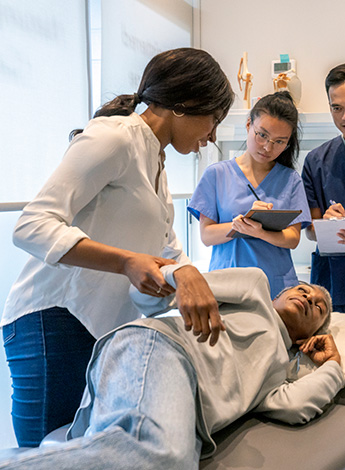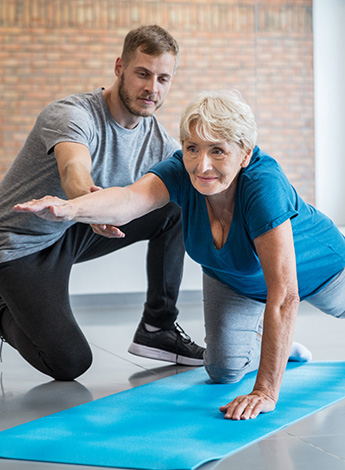
5 Facts: Physiotherapy and education

Emily Riglar, chair of the APA Educators national group, presents five discussion points about the pervasive role of education in physiotherapy and its many different forms.
There is a complex science behind effective teaching
Pedagogy is the term used to describe the theory and science behind teaching.

There is a large and rapidly growing body of literature covering clinical learning, effective assessment of clinical skills, workplace learning, the role of simulation and physiotherapy-specific assessment and learning.
More recently, the role of technical advances within education has been explored.
Evidence-based practice within physiotherapy clinical education begins with the Assessment of Physiotherapy Practice (APP) tool, which was developed by Dalton (2011).
The APP has been shown to be one of the strongest performing assessment measures used worldwide in clinical education (O’Connor et al 2018).
It enables us to evaluate clinical performance to the standard of a graduate on their first day of practice.
Our awareness of performance evaluation beyond the APP standard is more complicated and less clear.
Key concepts from educational literature can be applied to the knowledge and skill development of our early career physiotherapists (and beyond) to assist in the development of strong clinical skills and performance.
Some of these are core educational principles, while others have arisen from the unique challenges of workplace learning and of providing clinical care alongside education.
They are relevant to qualified physios and physiotherapy students alike.
Effective education is a skill that can be improved

An educator is effective due to a combination of their attributes, knowledge and skills rather than because they are the most highly skilled person in a specific area (Brown 2004).
Understanding pedagogical concepts can help to build and develop education skills.
Kolb’s experiential learning cycle (Kolb 1984), for example, describes learning as circular, requiring moments of concrete experience, reflective observation, abstract conceptualisation and active experimentation.
It’s much easier for learners to make meaningful change if they are provided with opportunities to experience
all of these moments.
This also suggests that learners need multiple opportunities over time to be able to fully demonstrate skill acquisition (Dijkstra et al 2010).
Vygotsky’s concept of the ‘zone of proximal development’ (Vygotsky 1978) explores
the gap between current knowledge and required performance.
When learners are asked to perform tasks where this gap is too great, they will be unsuccessful.
Another example is Devlin’s model of solution-based feedback, where solutions are generated by the ‘team’ of learner and educator in discussion instead of seeking out performance deficits (Devlin 2003).
Performance improves when learners are given numerous opportunities to reflect and receive feedback but only if there are subsequent opportunities to integrate their new knowledge into their performance (Boud & Molloy 2013).
Being an educator is a key competency for Australian physiotherapists
The APA’s Physiotherapy Competence Framework version 7.1 (launched in 2023) outlines seven physiotherapy roles, each with key competencies and skills.

These can be demonstrated over four performance levels: foundation, intermediate, highly developed and expert.
Teaching and education feature heavily in this document, at all performance levels and across all key competencies.
Education is a skill required of all physiotherapists as soon as they enter the workforce and it is embedded in all that we do.
In addition to the integration of education into our overall skill set, one of the roles described in the Physiotherapy Competence Framework is that of ‘scholar’.
Teaching is a skill that demonstrates competency in this area.
To quote page 23 of the framework, ‘As teachers physiotherapists facilitate, individually and through teams, the education of students, colleagues, co-workers, clients, the public and others.’
At the ‘highly developed’ and ‘expert’ levels—the equivalent of titled or specialist physiotherapists—mentoring, supervision and teaching are listed as expectations of all physiotherapists.
The development of education skills needs to begin with entry-level physiotherapists to ensure that, as a profession, we are collectively working to the highest possible standard.
Education skills provide vital support for early career physiotherapists
All pre-registration physiotherapists’ clinical skills are evaluated against the standard of the APP (Dalton 2011). The minimum required standard of this tool equates performance to that ‘expected of an entry- level graduate on their first day of practice’.

While this doesn’t tell us exactly what a new graduate is capable of, it does suggest that competence has only been determined for less complex clients.
The reality of physiotherapy is unpredictable, however, and it is very challenging in some situations to fully control the complexity of clients to which early career physios are exposed.
This was reflected in a work by Stoikov et al (2022), which identified increased patient complexity and case load volume as two factors likely to make both new graduates and their supervisors concerned about their readiness to practise.
In the presence of these challenges, a workplace that understands how to support the transition from student to
practitioner is critical to the success of both the novice physiotherapist and their employer.
This requires realistic expectations from both parties and strong pedagogical skills to continue the learning journey for new graduates.
We need to develop this important body of evidence further to ensure that we are teaching the right things at the right time to our early career physiotherapists.
Every physiotherapist is an educator
The role of education within physiotherapy is vast and spans both academic and clinical fields.
University training brings graduates to a point where they have the clinical skills required on their first day of work.

From that day on, physiotherapists are expected to educate others.
This can take many different forms, from explaining pathology or teaching an exercise program to training family members or running an in-service.
As our physiotherapy skills advance, so do the requirements of our skills as educators.
We share our profession’s knowledge with other professions, we supervise junior staff or students and we advocate for our services.
Like performing manual therapy, safely managing a medically unstable patient or following the process of clinical reasoning, educating others is a standalone skill.
Improving someone’s ability to educate, regardless of the setting, requires knowledge, practice and support.
Education isn’t something you can automatically expect every clinician to be able to do well.
As such, it is important that we start to think more, not only about the content we are trying to teach, but about how we do it.
This applies equally to how we teach clients within our treatment rooms, pre-registration physiotherapy students or physios anywhere along their career paths who are learning new information.
Quick links:
- References
- Infographic poster of this article.
>> Emily Riglar APAM MACP is an APA Musculoskeletal Physiotherapist with a Master of Clinical Education and the director of Carlton Physiotherapy Centre. She is the national chair of the APA Educators group and has served two terms as the chair of the Victorian branch of the Educators group, having joined as a committee member in 2018.
© Copyright 2025 by Australian Physiotherapy Association. All rights reserved.





